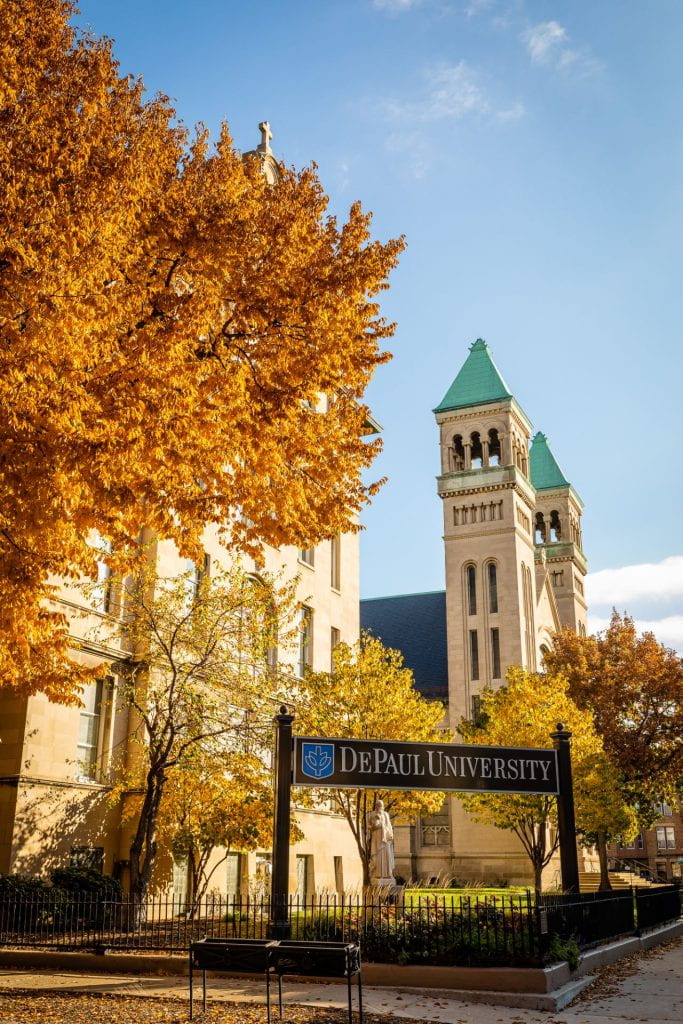
On Friday, amid much celebration and good will, DePaul will install Robert L. Manuel as our thirteenth president. This historic event, the culmination of a festive Inauguration Week, will not only mark the formal beginning of a new chapter in our university’s history; it will also amplify a call that is beginning to be heard around campus: the call for DePaul to change. It is said we must change to meet the challenges resulting from rising costs, social pressures, and demographic headwinds confronting higher education today and to which DePaul is not immune. And that we must change in ways that deepen our mission identity, ensure our sustainability, and allow us to flourish as a Vincentian, Catholic university in the twenty-first century. If all this is true and DePaul does need to change, the questions then become: what would this change look like? How would we do it? Where would we begin?
First, I suggest that the proper word for what DePaul needs to do at this moment is not change but transform. Change is inevitable. It is a constant. And there has probably never been a moment in DePaul’s 125-year history when we weren’t in the midst of some significant changes. Transformation, on the other hand, is special. It is unique, holistic, and even transcendent. Transformation is not reflexive but instead requires greater discernment, choice making, and faith in an uncertain future. It is more Vincentian. In seventeenth-century France, Vincent de Paul’s instinct was not so much to change the Catholic Church as it was to transform it from an institution of ill-prepared, absentee priests removed from their communities to one of service and accompaniment with those we might today understand as being marginalized. To echo the parables, Vincent, his collaborator Louise de Marillac, and their colleagues saw the church not so much as a pearl of great price, but as a seed whose roots burrowed into the soil of humanity, helping to bring life and growth to an awaiting world.
Second, as the call for transformation becomes louder, DePaul may wish to take direction from another wisdom figure, Mahatma Gandhi. Gandhi’s original, lengthier quote on change[1] may not be familiar to most, but its later, paraphrased version is known by many in the pithy statement “Be the change you wish to see in the world.” What if we at DePaul took this directive to heart? How might our university begin its transformation if the changes we seek also become the behaviors we model? For instance, if we aim for greater shared governance, how can each of us live out the elements of shared governance by listening more closely, striving for consensus, and treating all stakeholders with respect? If, as an institution, we value this thing called Vincentian personalism, how can we as individuals creatively show more care and compassion for our students as well as for our colleagues in faculty and staff? And, if DePaul is truly committed to our Vincentian legacy of service and justice for those most in need, how can we today more fully center those throughout our university, city, and world yoked by oppressive systems and struggling due to socioeconomic disadvantage.
To be sure, I am not saying that all change, let alone transformation, is simply the result of an individual’s inner workings manifested in their outer behaviors. As Vincent’s great colleague and cofounder, Saint Louise de Marillac, knew and communicated: changes are always difficult and they take time.[2] This is especially true at the systemic level, where much of the efforts need to be made. The work of transformation is challenging, arduous, disciplined, it comes with a cost, and it requires great numbers. That is why we will all need to play a role in transforming DePaul into the best version of our mission possible for the sake of the people who join our community in the decades to come.
Questions for Reflection:
Is there a change or transformation you would like to make in your own life? If so, how might the invitation to “be the change you wish to see in the world” help you? How might you contribute to DePaul’s ongoing transformation into more fully living out our mission?
Reflection by: Tom Judge, Assistant Director and Chaplain, Faculty and Staff Engagement, Division of Mission and Ministry
[1] Originally published in Indian Opinion, August 9, 1913, and reprinted in The Collected Works of Mahatma Gandhi, 98 vols. (New Delhi, Publications Division Government of India: 1999), chap. 153, 13:241. Available at: Gandhi Collected Works.
[2] “You are well aware that changes are always difficult, and that it takes time to learn new ways of serving the poor skillfully and well,” letter 337, “To My Very Dear Sister Cecile Agnés,” December 30, (1651), Spiritual Writings of Louise de Marillac, ed. and trans. by Louise Sullivan, DC (New York: New City Press, 1991), 385. Available at: https://via.library.depaul.edu/ldm/.
Tom, I love your reflection and perspective. Thank you! Always a thoughtful leader.
What a clear, simple and wonderful way to inspire us to confidently embark on the journey of transformation. We can do it!
I could not agree more that these times require transformation. To these wise words I would only add that transformation requires courage–courage to let go of old familiar patterns and ways of doing and being that may have served us in the past, but no longer serve a vision of prosperity through engagement, compassion, collectivism, and innovation. I strongly believe that faith is the fuel for courage and, in these time, we must have faith in our Vincentian commitments and rely on them to support the work of our transformation.